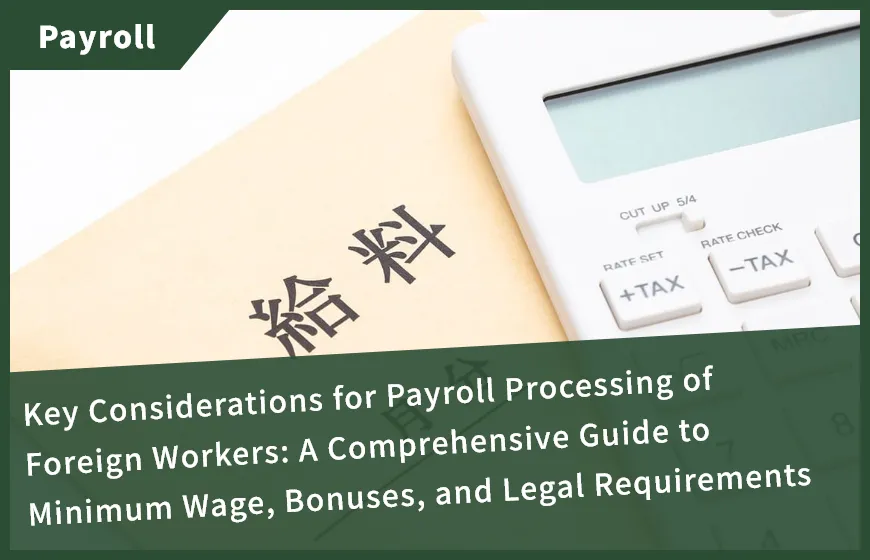
When employing foreign workers, there are Japan-wide rules common to Japanese employees—such as compliance with minimum wage, handling of bonuses, and processing of social insurance and taxes—plus additional considerations unique to foreign nationals.
This column explains foundational knowledge related to “payroll for foreign workers,” practical points of caution, and tips for avoiding legal risks. Through proper payroll management, let’s build a stable employment relationship free of disputes.
まずはお気軽に無料相談・
お問い合わせください!
目次
1. Basic Rules on Wages for Foreign Workers
With respect to wages for foreign workers, it is necessary—just as with Japanese employees—to understand the basic rules grounded in Japan’s legal system.
To set wages appropriately for foreign workers, we will explain in detail “the fundamentals of the minimum wage” and “the principle of equal pay for equal work.”
1-1. Fundamentals of the Minimum Wage
The minimum wage is a system by which the government sets the minimum amount of wages that employers must pay workers. In Japan, there are two types: the “regional minimum wage” and the “specific (industry-based) minimum wage.”
- Regional Minimum Wage
Set for each prefecture, the amount differs by region. When employing foreign workers, you must confirm the amount applicable to the location of your business establishment and pay wages at or above that regional minimum. - Specific Minimum Wage
Established for certain industries when a higher standard than the regional minimum is deemed necessary based on labor-management agreement. The covered industries differ by prefecture; where applicable, you must compare the regional and specific minimum wages and apply the higher amount.
The minimum wage applies to all workers, regardless of employment status or nationality.
If wages paid fall below the minimum wage, the employer may be subject to a fine (up to 500,000 JPY for violations of the general Minimum Wage Act; up to 300,000 JPY for violations related to specific minimum wages). In addition, employers may also be required to pay the unpaid wages for the difference.
Even for foreign workers, it is essential to recognize that compliance with the minimum wage is a legal obligation.
1-2. The Principle of Equal Pay for Equal Work
“Equal pay for equal work” is a framework aimed at eliminating unreasonable differences in treatment between regular employees and non-regular employees (part-time, fixed-term, dispatched, etc.). It has been fully applicable since 2020 and naturally applies to foreign workers as well.
Employers must set base pay, bonuses, and various allowances fairly, taking into account job content and the scope of reassignment, among other factors.
Reasonable differences in treatment based on variations in ability, experience, or responsibility are permitted; however, unjust disparities based solely on nationality or employment type may be deemed unlawful.
In particular, if job content and responsibility are equivalent yet only foreign workers are treated less favorably, this may be regarded as a violation of law.
Moreover, where non-regular employees’ job content and scope of reassignment are equivalent to those of regular employees, equal treatment is likewise required.
When determining pay for foreign workers, it is essential to correctly understand this “equal pay for equal work” principle and implement fair treatment.
2. Pay Structure and Payment Methods
When employing foreign workers, you must correctly understand what items are included in wages and how wages are to be paid. We explain in detail the basic pay structure, types of allowances, and the handling of bonuses.
2-1. Pay Structure
Wages are paid as consideration for labor and are composed of base pay and various allowances. Representative items are as follows:
- Base Pay
The compensation structure is based on elements such as seniority pay, length-of-service pay, skill-based pay, job-based pay, role-based pay, performance pay, and results-based pay, and is set according to occupation and career stage. - Various Allowances
Includes overtime allowance, commuting allowance, housing allowance, family allowance, etc.
These items must be explicitly stated in the employment contract and work rules.
In addition, payslips should show the amounts for each item, and employers should be prepared to explain them to workers.
2-2. Types of Allowances
Allowances are supplementary wage items added on top of base pay. Main types of allowances and points of caution include:
- Overtime Allowance
For overtime work, a wage premium of at least 25% must be paid. - Commuting Allowance
Paid as actual expenses or according to defined standards based on the use of public transportation or commuting by car. - Housing Allowance
Paid to subsidize housing costs. It is common to set conditions such as the foreign worker being the head of household. - Family Allowance
Paid according to whether the employee has dependents. It is advisable to establish a verification framework, such as requiring submission of a prior declaration.
When paying allowances, clearly state the conditions, amounts, and payment methods in the work rules and contract to ensure transparent administration.
2-3. How to Pay Bonuses
Bonuses are remuneration paid according to the company’s performance and the worker’s contributions.
Paying bonuses can be expected to improve motivation and retention. Key points include:
- Obligation to Pay
There is no legal obligation. The obligation arises when payment is specified in the employment contract or work rules. - Calculation Methods
Vary by company; examples include “X months of base pay” or totals based on performance ratings. The basis should be clarified in advance. - Deductions
Income tax and social insurance contributions are also levied on bonuses, so payslips showing the amounts deducted must be provided. - Timing of Payment
Typically once or twice a year (summer/winter), but this too should be communicated in advance in accordance with the contract or internal rules.
The systems and conditions for bonuses should be clearly stated in work rules or individual contracts and explained in an easy-to-understand manner to foreign workers.
3. Points of Caution in Payroll Calculation
For payroll involving foreign workers, proper withholding of taxes and social insurance contributions and accurate management of working hours are especially important. Processing must be conducted in accordance with laws and regulations, just as it is for Japanese employees. Therefore, please ensure you accurately understand the following points.
3-1. Taxes and Social Insurance
Income Tax
Income tax is, in principle, collected via “withholding at source,” whereby the employer deducts the tax from monthly wages and remits it to the national government. The withholding category depends on whether a Declaration of Exemptions for Dependents, etc. has been submitted, and is divided into three categories.
| Category | Overview | Characteristics |
| A(Ko) | If you have submitted a Dependent Deduction Declaration Form | Deductions are reflected; year-end adjustment applies |
| B(Otsu) | If you have not submitted the Dependent Deduction Declaration Form | Taxed without deductions; no year-end adjustment (final tax return required) |
| C(Hei) | Applicable to day labor, short-term part-time work, etc. | Taxed according to a uniform daily table |
Foreign workers who are subject to year-end adjustment will be reconciled after submitting the necessary documents. Pay particular attention to preventing omissions in submitting the dependents declaration.
Resident Tax
Resident (inhabitant) tax is calculated based on the previous year’s income and paid to the local municipality of residence. The most common method is “special collection,” where the employer deducts the amount from employees’ wages and remits. Foreign nationals are subject to resident tax if they are expected to stay in Japan for one year or more.
Social Insurance Contributions
In principle, foreign workers are also obligated to enroll in Japan’s social insurance system. The main insurances and their overviews are as follows.
| Insurance | Content | Example of Rate | Notes |
| Health Insurance | Subsidizes medical costs | Varies by prefecture (e.g., around 10%) | Employer-employee split |
| Employees’Pension | Old-age pension benefits | Uniform 18.3% | Employer-employee split |
| Employment Insurance | Unemployment benefits, etc. | General: 1.45% (Employee 0.55% /Employer 0.9%) | Burden ratios differ for labor and management |
| Long-Term Care Insurance | For those aged 40 and over | Approx. 1.59% | Employer-employee split(applies to ages 40–64) |
These contributions are deducted monthly from wages and remitted by the employer.
Since these systems may be unfamiliar to foreign workers, carefully explaining the deductions on the payslip helps prevent disputes. In particular, pensions may feel like a “pure burden” to foreign workers who do not intend to remain in Japan until old age.
There is a system called the “withdrawal lump-sum payment” under which pension contributions may be refunded after returning to one’s home country. We recommend that employers explain this as well to foreign workers.
Please also refer to our separate column on the lump-sum withdrawal payment.
3-2. Managing Working Hours
Proper management of working hours is essential for legal compliance and preventing unpaid wages. The Labor Standards Act applies in full to foreign workers.
Statutory Working Hours
Statutory working hours in Japan are as follows:
- Up to 8 hours per day and 40 hours per week
- Work exceeding these limits requires a “36 Agreement” (Article 36 overtime agreement) to be concluded and filed with the Labor Standards Inspection Office.
Rules on Premium Wages
Premium wages must be paid according to time bands and work types as follows:
| Work Category | Premium Rate |
| Overtime (over 8 hours/day) | +25% or more |
| Holiday work | +35% or more |
| Late-night work (10:00 p.m. – 5:00 a.m.) | +25% or more *Additional premiums apply when overlapping with overtime or holiday work. |
Methods of Recording Working Time
Working hours must be recorded accurately such as using time cards, attendance management systems, IC clock-ins. Solely oral or self-reported records may be deemed legally insufficient.
Provision of Breaks
- For work exceeding 6 hours: at least 45 minutes of break
- For work exceeding 8 hours: at least 1 hour of break
*As a rule, breaks must be provided in the middle of the working time.
4. Items to Include in Employment Contracts Concerning Pay
An employment contract is an important agreement between employer and worker. In particular, items related to pay must be clearly stated in the contract.
By clarifying working conditions in writing beforehand, you can prevent future disputes and build a smooth employment relationship.
With foreign workers as well, an employment contract should always be concluded, its contents explained, and signatures obtained—this is the legally advisable approach.
Importance of the Employment Contract
An employment contract prevents discrepancies in understanding between the parties by specifying items such as the following:
- Working hours, breaks, and holidays
- Wages (such as base pay, allowances, bonuses, closing date and payment date)
- Whether the employee is enrolled in social insurance
- Rules on dismissal and resignation
*Because pay itemsin particular are prone to misunderstanding, it is reassuring to clearly state amounts, conditions, and payment timing in advance.
Main Pay-Related Items to State
You can prevent misunderstandings or distrust concerning pay by specifying the following:
| Item | Content |
| Base Pay | Fixed amount paid monthly; state the specific figure. |
| Allowances | Overtime, commuting, housing, family allowances, etc.; also state the conditions for payment. |
| Bonuses | State whether bonuses are paid, timing, and calculation method (not mandatory by law, but if paid, be sure to specify). |
| Payroll Closing & Payment Dates | E.g., closing on day X each month, payment on day Y of the following month; by principle, payment must be set on a “fixed day each month.” |
| Social Insurance Enrollment | State whether enrolled in health insurance, employees’ pension, and employment insurance, and indicate the basis for payroll deductions. |
5. Common Payroll Disputes and How to Address Them
With foreign workers, differences in culture and language and unfamiliarity with the system can lead to payroll-related disputes. Below are frequently observed cases and their countermeasures.
[Case 1] Divergent Understandings Regarding Commuting Expenses
A complaint to accounting: “The amount is less than my actual commuting cost, so please pay the difference.”
The work rules stipulated “payment equivalent to a 6-month commuter pass,” but the worker did not purchase a commuter pass and instead topped up an IC card for each trip.
Countermeasures:
- State the payment standards clearly in work rules and employment contracts.
- At hiring, explain concretely the payment method (based on a commuter pass or actual expense reimbursement).
- Prepare guidance in foreign languages and a commuting-route confirmation sheet.
[Case 2] Misunderstanding About Overtime Pay
Claim: “I am working overtime but not being paid overtime wages.” In fact, a fixed overtime allowance system was in place, but the worker did not understand how it worked.
Countermeasures:
- At the time of contracting, explain the breakdown of fixed overtime and the obligation to pay additional wages when actual hours exceed the fixed amount.
- Prevent misunderstandings by preparing multilingual contracts and explanatory materials.
- Keep accurate records of actual working hours and reflect them in monthly payslips.
[Case 3] Dissatisfaction Over Whether a Bonus System Exists
Seeing that other employees received bonuses, a worker became dissatisfied: “Why don’t I receive one?”
Countermeasures:
- Clarify that bonuses are not a statutory obligation, and state in the contract or work rules whether bonuses are paid and under what conditions.
- Where there are eligibility criteria or evaluation standards, explain them as specifically as possible.
Many such disputes arise from “insufficient explanation of the system” or “gaps in understanding.” Provide careful explanations at hiring and at the time of payment, inform employees that there are established written rules, and strive to prevent disputes.
6. Summary
In this article, we explained key points from basic knowledge regarding wages for foreign workers to contract items, the handling of taxes and social insurance, and tips for preventing disputes.
When employing foreign workers, it is required that precise payroll calculation in accordance with Japanese labor laws and the clear presentation of working conditions. If you feel uncertain about systems or procedures, it is also an effective option to consult a labor and social security attorney (sharoushi) or other specialists.
At Daiichi Sogo Labor and Social Security Attorney Corporation, we accept inquiries regarding the employment of foreign nationals at any time. When you consult with us, our experienced staff will work as a team to respond carefully.
We hope this column will be helpful for your company’s employment of foreign workers. Please make use of it as a reference for future talent utilization.
この記事の監修者
社会保険労務士法人第一綜合事務所
社会保険労務士 菅澤 賛
- 全国社会保険労務士会連合会(登録番号13250145)
- 東京都社会保険労務士会(登録番号1332119)
東京オフィス所属。これまで800社以上の中小企業に対し、業種・規模を問わず労務相談や助成金相談の実績がある。就業規則、賃金設計、固定残業制度の導入支援など幅広く支援し、企業の実務に即したアドバイスを信念とする。








